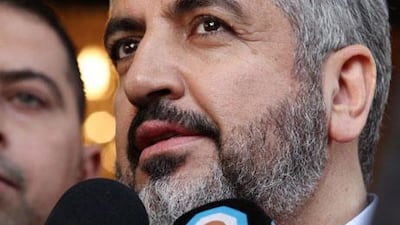JERUSALEM // Hamas yesterday announced the departure of Khaled Meshaal, the chairman of its peak political bureau and widely seen as the Islamist movement's most powerful political figure.
The Damascus-based Mr Meshaal has decided not to stand for re-election at a ballot for his post due in July or August, Hamas said in a statement. The decision ends speculation about his future amid bickering between Hamas leaders inside the Gaza Strip and those outside over how to deal with Israel.
The political and ideological implications - coming when Mr Meshaal has been pushing reconciliation with his group's West Bank secular rival, Fatah - are unclear. The 55-year-old, who survived an Israeli assassination attempt in 1997, will remain active in Hamas, which rules Gaza.
He has widely been considered a hardliner, using his hold on the purse strings to press Gaza's pragmatic leadership towards more extreme positions against Israel.
But Hamas officials in the Gaza Strip have been increasingly critical of Mr Meshaal because of his recent softening on Israel and his reconciliation efforts with Fatah.
Mr Meshaal has suggested he would support a Palestinian state side-by-side with Israel, a shift from Hamas's previous rejection of the existence of Israeli state, and he has called for talks rather than violence.
He has also ordered Hamas inside Gaza not to fire missiles into Israel and said recently popular protest, not violence, has "the power of a tsunami" for change, referring to the Arab Spring reshaping the Middle East.
The bickering is an unusual public airing of differences for a disciplined group that prides itself on resolving internal frictions behind closed doors. It suggests a rebalancing of power in favour of the leaders inside the Gaza Strip as its outside leadership struggles with massive new challenges.
Shorn by the revolt in Syria of its relatively safe sanctuary and no longer assured of the committed support of President Bashar Al Assad - himself fighting to survive - its leadership is scrambling for a new base.
And with the shifting and uncertain geopolitics of the Arab Spring, Hamas is being forced to reassess its relationship with long-standing patrons Tehran and Damascus.
Among the leading candidates to replace Mr Meshaal are his number two, Mussa Abu Marzuq, who also lives in exile, Ismail Haniya, the Hamas Gaza prime minister, and Mahmud Zahar, another prominent Gaza Hamas figure.
George Giacaman, a professor in Birzeit University's democracy and human rights programme, said Mr Meshaal probably quit because most Hamas leaders disagree with his new tactics and pressured him to go.
Mahmoud Zahar, a Hamas hardliner based in Gaza, has criticised the move closer to Fatah.
"It's a bit odd that he's leaving right now, whatever reason Hamas gives publicly," said Mr Giacaman.
The increasingly precarious links with the troubled Syrian regime, where thousands of people have died in a 10-month revolt against Mr Al Assad that threatens to plunge the country into civil war, may have stroked frictions within Hamas, which has moved senior people out of Damascus and is looking for a new home in exile, he added.
Israel's Haaretz newspaper reported last week a frustrated Mr Meshaal threatened to quit at a meeting in Sudan in a bid to pressure his critics, such as Mr Haniya, to back off.
But Mr Haniya responded the leadership in Damascus could no longer impose their decisions on Gaza.
But bitter divisions between Hamas inside Gaza and Hamas outside tend to come when the group is under severed external strain and often work themselves out, analysts say.
The 2008-09 Israeli assault on Gaza exposed a compartmentalisation of decision-making between the military wing in Gaza and the political wing in Damascus, that was later resolved.
It has faced tougher challenges, such when its founder, Ahmed Yassin, and his successor, Abdel Aziz Al Rantisi, were killed within a month of each other in 2004.
Hamas regrouped and the incident had little impact on its unity and effectiveness.
hnaylor@thenational.ae
* Additional reporting by Omar Karmi
Follow
The National
on
& Hugh Naylor on

